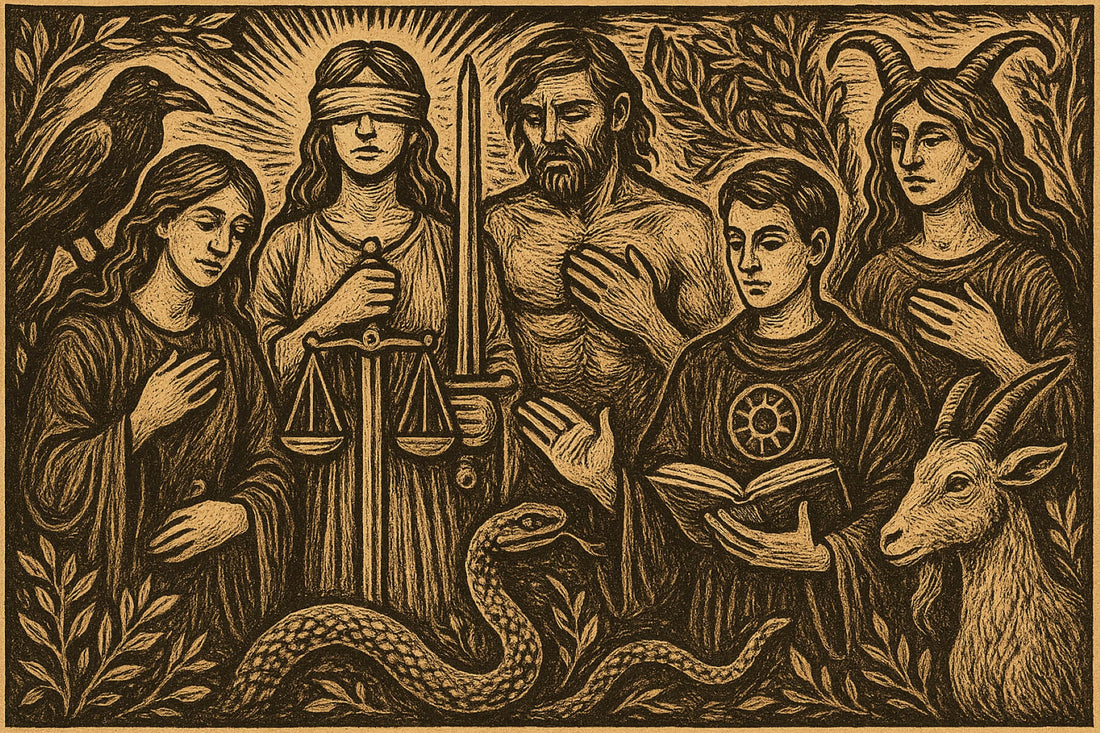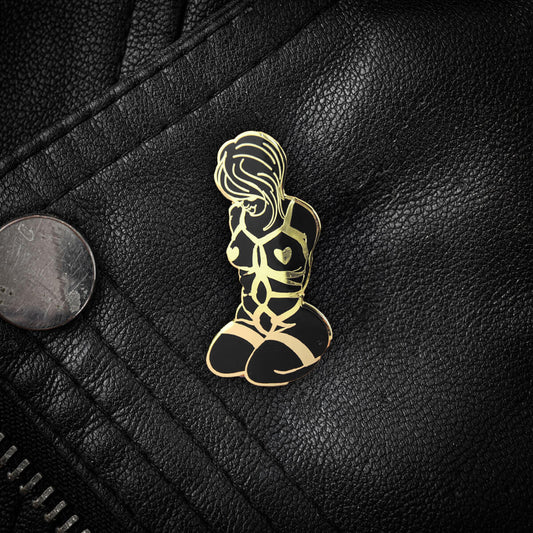
What are the 7 Tenets of Satanism?
Share
Say "Satanism" and most people picture cloaks, pentagrams, or something out of a bad horror film. That version comes from media hysteria and moral panic, not from actual Satanists. The Satanic Temple, one of the most well-known modern Satanic organisations, couldn’t be further from that stereotype.
The Temple doesn’t believe in supernatural beings. It doesn’t promote worship. And it isn’t built around shock for shock’s sake. At its core are seven principles that shape how its members live and think. These are called the Seven Tenets of Satanism, and they form the backbone of the group’s ethics.
Unlike religious commandments, the Tenets aren’t fixed rules handed down from above. They’re ideas to be reflected on and applied with reason. They promote values like compassion, bodily autonomy, scientific thinking, and personal responsibility. For many people, they offer a framework that feels more human and more modern than the moral codes found in older religions.
They’re written in plain language, with a strong focus on compassion, justice, science, and personal freedom. In my view, they read more like a humanist manifesto than anything remotely sinister.
They’ve also been central to real-world activism. The Satanic Temple uses them to challenge religious privilege in government, to protect access to abortion, and to argue for freedom of belief in public institutions.
In this article, we’ll go through each Tenet, explain what it means, and look at how it fits into the wider philosophy of modern Satanism.
Key Points
- The Seven Tenets are ethical principles, not religious laws, created by The Satanic Temple to promote justice, compassion, and personal responsibility.
- The Satanic Temple is non-theistic and uses Satan as a symbol of rebellion against arbitrary authority, not as a figure of worship.
- Each tenet encourages critical thinking and moral accountability, including bodily autonomy, scientific understanding, and the duty to correct mistakes.
- The Tenets guide real-world activism, from legal challenges on religious freedom to campaigns for reproductive rights and public education.
- Criticism mostly stems from the name “Satan,” but the tenets themselves are widely seen as rational, secular, and grounded in human rights.
The Purpose of the Tenets
The Seven Tenets are not commandments. They’re not laws, dogmas, or threats from a higher power. They’re ethical principles. That’s an important difference. Unlike religious rules handed down from supposed divine authority, these tenets are open to thought and interpretation. They’re designed to encourage responsibility, not obedience.
Each tenet stands alone, but together they form a framework for how to behave with integrity. They’re used as a moral compass by members of The Satanic Temple, especially when facing real-world problems. Whether it’s defending someone’s bodily autonomy or speaking out against injustice in law or education, the tenets offer a foundation to build arguments on.
They also reflect the Temple’s focus on personal sovereignty and reason. Beliefs should be challenged by facts. Compassion should be balanced with logic. And if you mess up, you’re expected to take responsibility. That’s something I respect. The whole system puts the weight of decision-making back on the individual. No one to blame, no one to blindly follow. Just you, your conscience, and your actions.
Photo by Edgar Chaparro on Unsplash
The Seven Tenets Explained
Here’s where things get concrete. These are the actual Seven Tenets of The Satanic Temple, each followed by a plain-English breakdown. They’re listed publicly on TST’s official website and rarely edited. Unlike religious scriptures, these weren’t meant to be mysterious or poetic. They’re direct and surprisingly reasonable.
- “One should strive to act with compassion and empathy toward all creatures in accordance with reason.”
This one’s about being kind, but not blindly so. It’s not asking for self-sacrifice or martyrdom. It’s saying compassion matters, but it has to make sense. You’re not required to let people walk all over you. Empathy is important, but logic should still guide your choices. It’s a balance between feeling and thinking.
- “The struggle for justice is an ongoing and necessary pursuit that should prevail over laws and institutions.”
This tenet draws a line in the sand. If the law is unfair, challenge it. If a system protects harm or silences people, it needs fixing. That might sound radical, but it's built on the idea that justice isn’t static. It evolves. This tenet is the one that fuels a lot of TST’s activism, especially their legal work against religious privilege in public institutions.
- “One’s body is inviolable, subject to one’s own will alone.”
Clear and blunt. Nobody has a right to your body except you. It doesn’t matter if it’s the state, a church, or your family. This tenet has become the cornerstone of TST’s reproductive rights work, especially in the United States. It’s hard to argue with, unless you think bodily autonomy should have limits based on someone else’s belief system.
- “The freedoms of others should be respected, including the freedom to offend. To willfully and unjustly encroach upon the freedoms of another is to forgo one’s own.”
This one throws a sharp elbow at cancel culture and censorship. Freedom of speech means hearing things you don’t like. Being offended doesn’t give you the right to shut others down. That said, it also warns that trampling someone else’s rights can cost you your own. It’s a reminder that freedom cuts both ways.
- “Beliefs should conform to one’s best scientific understanding of the world. One should take care never to distort scientific facts to fit one’s beliefs.”
Faith isn’t good enough. This tenet calls for evidence, not gut feelings or tradition. It means rejecting conspiracy theories, pseudoscience, and magical thinking. It also demands flexibility. If new facts come in, you’re expected to change your mind. It’s anti-dogma and pro-reality. I think this one should be printed on every politician’s desk.
- “People are fallible. If one makes a mistake, one should do one’s best to rectify it and resolve any harm that might have been caused.”
Everyone screws up. That’s a given. What matters is how you deal with it. This tenet rejects the idea of unforgivable sins or eternal guilt. You apologise, you fix what you can, and you try to be better. That’s the standard. In practice, it’s tough - but I respect how it builds humility into the philosophy.
- “Every tenet is a guiding principle designed to inspire nobility in action and thought. The spirit of compassion, wisdom, and justice should always prevail over the written or spoken word.”
This is the catch-all. Don’t follow these rules to the letter just because they’re written down. Follow the intent. If the tenets ever clash with what’s right, then what’s right wins. It’s a failsafe against fundamentalism. No rigid script. Just common sense and ethics. That final point is what makes this whole structure work for modern minds.

How the Tenets Influence Real-World Action
The Seven Tenets aren’t just slogans. They shape everything The Satanic Temple does in public life. That includes protests, lawsuits, educational programmes, and campaigns for equal rights. If a campaign doesn’t align with the tenets, it doesn’t happen. They serve as the filter for what’s worth fighting for.
Take the After School Satan Club. It was launched to counter evangelical “Good News Clubs” operating in public schools. TST doesn’t promote Satan or religion in those clubs; instead, they teach kids about science, critical thinking, and civic responsibility. That ties directly to Tenets 1 and 5 - compassion and evidence-based understanding.
Their legal campaigns are more aggressive. When a Ten Commandments monument was put up at a state capitol in Arkansas, TST pushed back by demanding equal space for their own Baphomet statue. The goal wasn’t to glorify Satan; it was to challenge government bias and reinforce the principle of religious neutrality (Tenet 2: justice over institutions). The logic is simple: if one religion gets a platform, they all do, or none do.
They’ve also challenged abortion laws using Tenet 3 - bodily autonomy. In states with restrictive abortion rules, TST members have claimed religious exemption under their belief in the inviolability of the body. Whether you agree or not, it’s a sharp use of the system to test the limits of religious freedom laws.
Even their charitable work is rooted in the tenets. During the COVID-19 pandemic, TST chapters delivered food and medical supplies to struggling families. That was Tenet 1 in action - compassion and empathy, grounded in reason.
In short, the tenets don’t just sit on a website. They drive real action. And that’s what makes them different from the vague, abstract values many institutions like to promote but rarely live by.
Criticisms and Misunderstandings
Despite how reasonable the Seven Tenets sound on paper, The Satanic Temple attracts plenty of criticism. A lot of it comes down to one word: Satan. For many people, that alone is a deal-breaker. Even when it’s clearly stated that TST doesn’t believe in or worship any supernatural being, people still associate the name with evil, crime, or occult nonsense. That confusion fuels outrage, especially from religious groups and conservative media.
Some critics say the temple’s use of Satan is deliberately provocative and offensive. That’s not entirely wrong. The image is meant to provoke - but not just for shock value. It forces a conversation about freedom, fairness, and hypocrisy in systems that claim to be neutral but clearly favour Christianity. Still, that approach has backfired in some cases. Public backlash can drown out the actual message.
Then there’s the tension with the Church of Satan. The older organisation has repeatedly dismissed TST as "activist theatre" and “politically correct Satanism.” They argue that TST borrows LaVeyan aesthetics without sticking to the core philosophy of individualism and non-intervention. TST, in turn, sees the Church of Satan as outdated and largely inactive, more concerned with image than impact.
Some secularists also push back. They argue that using Satan at all creates unnecessary noise. Why not just be a humanist group and skip the controversy? The answer from TST is that Satan is a cultural symbol of rebellion and defiance against tyranny - not a gimmick, but a rallying point. It draws attention, and more importantly, it tests how real freedom of religion actually is.
Whether you think that strategy is smart or self-defeating depends on your view of activism. But it’s clear that most criticism doesn’t come from reading the tenets. It comes from reacting to the name. Which says more about the critics than the ideas.
So, to conclude; the Seven Tenets of The Satanic Temple are not what most people expect when they hear the word "Satanism." They're not about worship, rituals, or invoking anything supernatural. They're a set of ethical principles built around compassion, justice, autonomy, science, and personal responsibility. And they’re written in clear, grounded language that’s easy to apply to real life.
What stands out is how these tenets demand action. They’re not about following rules to avoid punishment; they’re about doing what’s right, even when it’s hard. Whether that means standing up for your own body, defending free speech, or admitting when you’ve made a mistake, the message is the same: your ethics are your responsibility.
They also challenge people to think critically. If your beliefs conflict with facts, the facts should win. If a law is unjust, you’re expected to fight it. That makes the tenets far more active than passive. They're meant to push people to improve themselves and the systems they live in.
Agree or not, there’s something refreshing about how honest it all is. There’s no promise of reward, no threat of punishment. Just a framework for living with integrity. And that alone puts them in a very different category from most religious or moral codes.
If you had to pick one of these tenets to live by, which one would challenge you the most?














